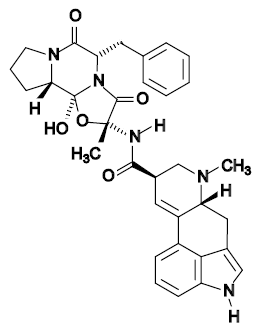Ergotamine

Ergotamine is a medication used to treat certain types of headaches and migraines. It is derived from ergot, a fungus that grows on rye and other grains. Ergotamine works by constricting blood vessels in the brain and inhibiting the transmission of pain signals.
History[edit]
Ergotamine was first isolated from ergot in 1918 by Arthur Stoll and Albert Hofmann at the pharmaceutical company Sandoz. It was initially used to induce childbirth and to stop bleeding after delivery, but its use in obstetrics was discontinued due to severe side effects.
Medical uses[edit]
Ergotamine is primarily used to treat migraine attacks. It is often combined with other medications, such as caffeine, to increase its effectiveness. Ergotamine is not used for routine headache or tension headache.
Side effects[edit]
Common side effects of ergotamine include nausea, vomiting, and abdominal pain. More serious side effects can include muscle pain, numbness, and tingling in the fingers and toes. In rare cases, ergotamine can cause a serious condition called ergotism, which can lead to gangrene and the need for amputation.
Pharmacology[edit]
Ergotamine acts as a vasoconstrictor, narrowing blood vessels in the brain. It also inhibits the release of a neurotransmitter called substance P, which is involved in pain transmission.
See also[edit]
| Medications | ||||||||||
|---|---|---|---|---|---|---|---|---|---|---|
This Medication related article is a stub.
|
| Migraines | ||||||||
|---|---|---|---|---|---|---|---|---|
This migraine-related article is a stub.
|
Ad. Transform your life with W8MD's Budget GLP-1 injections from $75


W8MD offers a medical weight loss program to lose weight in Philadelphia. Our physician-supervised medical weight loss provides:
- Weight loss injections in NYC (generic and brand names):
- Zepbound / Mounjaro, Wegovy / Ozempic, Saxenda
- Most insurances accepted or discounted self-pay rates. We will obtain insurance prior authorizations if needed.
- Generic GLP1 weight loss injections from $75 for the starting dose.
- Also offer prescription weight loss medications including Phentermine, Qsymia, Diethylpropion, Contrave etc.
NYC weight loss doctor appointmentsNYC weight loss doctor appointments
Start your NYC weight loss journey today at our NYC medical weight loss and Philadelphia medical weight loss clinics.
- Call 718-946-5500 to lose weight in NYC or for medical weight loss in Philadelphia 215-676-2334.
- Tags:NYC medical weight loss, Philadelphia lose weight Zepbound NYC, Budget GLP1 weight loss injections, Wegovy Philadelphia, Wegovy NYC, Philadelphia medical weight loss, Brookly weight loss and Wegovy NYC
|
WikiMD's Wellness Encyclopedia |
| Let Food Be Thy Medicine Medicine Thy Food - Hippocrates |
Medical Disclaimer: WikiMD is not a substitute for professional medical advice. The information on WikiMD is provided as an information resource only, may be incorrect, outdated or misleading, and is not to be used or relied on for any diagnostic or treatment purposes. Please consult your health care provider before making any healthcare decisions or for guidance about a specific medical condition. WikiMD expressly disclaims responsibility, and shall have no liability, for any damages, loss, injury, or liability whatsoever suffered as a result of your reliance on the information contained in this site. By visiting this site you agree to the foregoing terms and conditions, which may from time to time be changed or supplemented by WikiMD. If you do not agree to the foregoing terms and conditions, you should not enter or use this site. See full disclaimer.
Credits:Most images are courtesy of Wikimedia commons, and templates, categories Wikipedia, licensed under CC BY SA or similar.
Translate this page: - East Asian
中文,
日本,
한국어,
South Asian
हिन्दी,
தமிழ்,
తెలుగు,
Urdu,
ಕನ್ನಡ,
Southeast Asian
Indonesian,
Vietnamese,
Thai,
မြန်မာဘာသာ,
বাংলা
European
español,
Deutsch,
français,
Greek,
português do Brasil,
polski,
română,
русский,
Nederlands,
norsk,
svenska,
suomi,
Italian
Middle Eastern & African
عربى,
Turkish,
Persian,
Hebrew,
Afrikaans,
isiZulu,
Kiswahili,
Other
Bulgarian,
Hungarian,
Czech,
Swedish,
മലയാളം,
मराठी,
ਪੰਜਾਬੀ,
ગુજરાતી,
Portuguese,
Ukrainian
